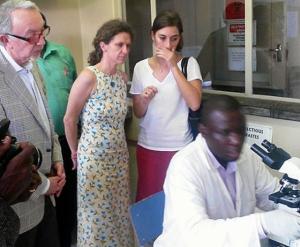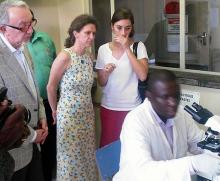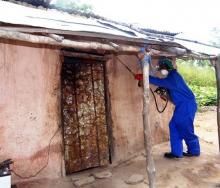Monaco team field visits to Mashonaland West
Harare, 4 Mar 2014 -- The Government Counselor for External Relations of the Principality of Monaco, M. José Badia and his delegation together with WHO and Ministry of Health and Child Care officials, undertook field visits to Mashonaland West province which has some of the malaria high burden districts. During the first leg of the field visit, the team visited Chinhoyi Provincial Hospital, where the key finding was a drastic reduction in the malaria case load.
There were no recorded malaria cases or deaths since the beginning of 2014. The Provincial Medical Director, Dr W. Nyamayaro said the decline could be attributed to the good uptake of malaria interventions at all levels in the province and that the village health workers in the districts were knowledgeable about malaria control and were highly motivated. M. Badia and his team witnessed the use of RDTs during the screening process, and also had the chance to observe laboratory technicians conducting laboratory tests for malaria.
All suspected cases tested were negative, which is an illustration of the decline in malaria incidence. From all the discussions that took place it became apparent that even though the malaria case load has reduced there is still need to intensify all actions, increase surveillance and come up with new strategies if the gains are to be sustained until pre elimination is achieved.
After Chinhoyi, the team went to Kariba district, one of the malaria high burden districts. In Kariba district the team had a chance to see Indoor residual spraying (IRS), which, together with the use of long lasting insecticidal nets (LLINs) are the key interventions in malaria control in the district. At Kariba District Hospital, there was also a marked reduction in malaria case load with no malaria patients admitted during the time of the visit, and no rec-orded deaths for 2014.
The team also had a chance to visit Nyamhunga Clinic which is a sentinel site for therapeutic efficacy testing, and Kazungunye Clinic which is a vector surveillance sentinel site. At Nyamhunga clinic the sentinel site is fully operational although its difficult to get adequate patients due to the low malaria incidence, and those who test positive for malaria not meeting the inclusion criteria. At Kazungunye and Nyamakate rural clinics there was a seasonal increase of malaria cases recorded but there were no recorded deaths for 2014.
The field visits demonstrated that although malaria is no longer a public health issue, there is still a lot that needs to be done to get to pre elimination status.
_________________________________________________________________
For more information contact:
juliasw [at] who.int (juliasw[at]who[dot]int)





